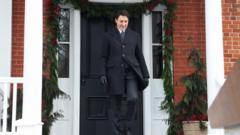In a pivotal moment for Canadian politics, Prime Minister Justin Trudeau announced his resignation after nearly nine years in office, a tenure marked by both significant achievements and deepening frustrations. Facing mounting pressure from within the Liberal Party and a surging Conservative opposition, Trudeau recognized that his ongoing leadership battles were impacting his ability to unite the party for future elections.
The prime minister's decision, made in front of Rideau Cottage, comes as a stark reminder of the shifting political tides in Canada. His initial rise to power in 2015 was hailed as a transformational event, with Trudeau embodying a progressive vision that brought the Liberal Party from third place to a commanding majority in Parliament. However, the political landscape has since evolved, and Trudeau's administration has struggled to maintain its footing amid various challenges.
Despite an impressive resume—including navigating the COVID-19 crisis, renegotiating trade agreements, and implementing poverty alleviation strategies—criticism has mounted regarding Trudeau’s perceived disconnect from public sentiment. Canadian political journalist Paul Wells noted that Trudeau's leadership will be remembered as significant, yet marred by controversies such as ethics violations and handling sensitive issues like immigration.
The liberal leadership faced undeniable setbacks in the last few years, including dwindling support in public opinion polls and losing several special elections in traditionally Liberal districts. The emergence of Conservative leader Pierre Poilievre, buoyed by a sharp campaign style, highlighted the urgency for the Liberal Party to reassess its strategies moving forward.
Trudeau's announcement reflected a critical moment for the party, with increasing calls for a change in leadership to rejuvenate Liberal chances in the upcoming elections. His internal battles ultimately demonstrated a disconnect not only within party ranks but also with the electorate. Many believe that the cumulative effect of a complicated agenda and perceptions of failures to deliver meaningful change led to widespread fatigue with Trudeau's administration.
As Canada prepares for a new chapter, there remains uncertainty about the future direction of the Liberal Party and how it will navigate the complex political landscape marked by rising inflation and global uncertainty. The question now arises—who will step forward to lead, and can the Liberals reclaim their position in an increasingly competitive political arena?
The prime minister's decision, made in front of Rideau Cottage, comes as a stark reminder of the shifting political tides in Canada. His initial rise to power in 2015 was hailed as a transformational event, with Trudeau embodying a progressive vision that brought the Liberal Party from third place to a commanding majority in Parliament. However, the political landscape has since evolved, and Trudeau's administration has struggled to maintain its footing amid various challenges.
Despite an impressive resume—including navigating the COVID-19 crisis, renegotiating trade agreements, and implementing poverty alleviation strategies—criticism has mounted regarding Trudeau’s perceived disconnect from public sentiment. Canadian political journalist Paul Wells noted that Trudeau's leadership will be remembered as significant, yet marred by controversies such as ethics violations and handling sensitive issues like immigration.
The liberal leadership faced undeniable setbacks in the last few years, including dwindling support in public opinion polls and losing several special elections in traditionally Liberal districts. The emergence of Conservative leader Pierre Poilievre, buoyed by a sharp campaign style, highlighted the urgency for the Liberal Party to reassess its strategies moving forward.
Trudeau's announcement reflected a critical moment for the party, with increasing calls for a change in leadership to rejuvenate Liberal chances in the upcoming elections. His internal battles ultimately demonstrated a disconnect not only within party ranks but also with the electorate. Many believe that the cumulative effect of a complicated agenda and perceptions of failures to deliver meaningful change led to widespread fatigue with Trudeau's administration.
As Canada prepares for a new chapter, there remains uncertainty about the future direction of the Liberal Party and how it will navigate the complex political landscape marked by rising inflation and global uncertainty. The question now arises—who will step forward to lead, and can the Liberals reclaim their position in an increasingly competitive political arena?




















